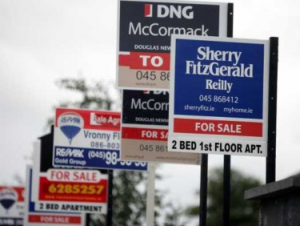Spring is a popular time for buying and selling property. Hopefully the answers to the following questions will give you some insight about the process of selling your home.
 How do I sell my house?
How do I sell my house?
There are two ways to sell a house – by private treaty or by auction. It is important to be guided by an auctioneer or other professionals in the area as to the best way to sell your particular house. Which method is the better will depend on a number of factors including the type of house, the state of the property market, the area etc. This is why it is best to consult a professional in the area to see what the best option is for you. No matter what method you use it is essential that you notify your solicitor of your plans to sell the house so that he may prepare the title documents and the contract for sale.
Do You Have a Mortgage?
Most houses these days have mortgages on them. If your house still has a mortgage on it you will need to give authorisation to the solicitor to take up the title deeds from the lending institution in order to prepare the contract for sale. It is important to do this as early as possible to give the solicitor time.
Preparing the Contracts for Sale
The Contract For Sale is drawn up once the solicitor has received all the relevant documentation from you and the lending institution. If the solicitor is preparing contracts for a sale by auction he/she just leaves the purchaser and purchase price blank until the auction is over and the purchaser is then known. Obviously, before the auction, the prospective bidders will want to check the title documents before the auction. If the sale is by private treaty the contract will contain all names including the purchase price.
Planning Permission
Any house built since the 1st October 1964 requires planning permission. The solicitor will need to make sure that the planning documentation is in order. This will usually entail an architect’s certificate stating that the conditions of the planning regulations have been complied with. If there has been any development on the property a similar approval will be required. It is very important that the planning documents are in order before the proposed sale. Otherwise, the potential purchaser may, on discovery of a discrepancy, pull out of the transaction at a very late stage.
Selling the Family Home.
If you are selling your family home, even if it is in only one of the spouse’s names the consent of the other spouse is required. This is required under the Family Home Protection Act 1976. If both names are on the deeds then the problem does not arise, as both their signatures are required anyway. On completion of the sale of the family home, both spouses will have to sign a Family Home Protection Act Declaration. You will also have to produce a copy of your State Marriage Certificate.
Signing Contracts and Closing
On the 1st January 2019, the Law Society of Ireland introduced a new pre-contract investigation of title (PCIT) system, which was designed to speed up the conveyancing process. This means that any questions relating to the property’s title are raised and resolved before the contracts are signed. Once this has been done, the contracts and a copy of the title deed of the property are then sent to the purchaser’s solicitor for signing. He/she will then research the title and study the contract’s conditions and then advise his/her client as to any changes/issues that may be relevant.
After these have been addressed he/she will then ask the purchaser to sign the contract and pay a deposit. The contract is then returned to the vendor’s solicitor who will call on the vendor to sign the contract in duplicate. The vendor’s solicitor will prepare the documents for closing and if there is a mortgage he will obtain redemption figures from the lending institution. The vendor (and spouse if necessary) will then sign the closing documents, including any necessary declarations, which must be sworn before an independent Solicitor.
On closing, the vendor’s solicitor will meet the buyers’ Solicitor and exchange the keys to the property, which the vendor will have given him/her, for the purchase money.
Buying and Selling at the same time
This can be quite a tricky area if you are trying to juggle both to happen at the same time. It is very important to consult your solicitor in this area, as they will have experience in such matters. It is usually best to first get a binding contract for the purchase of the new house. You may want to sign the contract for the purchase of the new house contingent on the sale of your old house going through. It is not essential that both closings be on the same day, as things can go wrong at the last moment.
Selling a House and Taxation
If you are selling a house, which is not your main residence, then you must pay Capital Gains Tax. If the property is your main residence then you are not liable for Capital Gain Tax. Again your solicitor will advise you as to the amount that you will have to pay to the Revenue Commissioners. It will depend on the value of the house. Whether or not it is your main residence your solicitor will have to get a Capital gains Tax Certificate for the purchase price if the purchase price is greater than the threshold set by the Revenue Commissioners. You will also have to give your P.P.S. number to the solicitor.
Please feel free to contact us should you have any questions about buying or selling a property. Or for more information on this topic visit the Law Society’s guide to property transactions here.